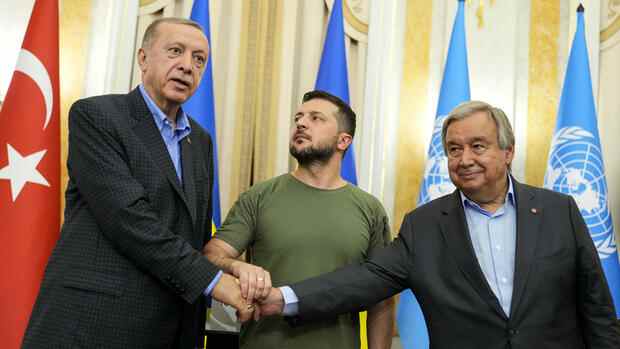Selenski thanked Erdogan and Guterres for mediating in the dispute over the grain agreement.
(Photo: dpa)
Kyiv Ukrainian President Volodymyr Zelensky sees the resumption of the grain agreement as a partial success in the war with Russia. “Russian blackmail has led to nothing,” said Zelenskiy in his evening video address on Wednesday.
Zelenskiy particularly praised UN Secretary-General António Guterres and Turkish President Recep Tayyip Erdogan and other key partners as mediators. “Once again, everyone has seen that in our region there is only one threat to global food security, and that is the Russian Federation and nobody else,” he said after more than eight months of war.
However, Kremlin chief Vladimir Putin did not rule out a new exit from the grain agreement with Ukraine, should there be violations from a Russian point of view. “Russia reserves the right to withdraw from these agreements in the event that the guarantees are violated by Ukraine,” Putin told a video conference with the National Security Council on Wednesday.
Even if the agreement is withdrawn, Russia is prepared to allow grain deliveries intended for poorer countries to pass through the agreed corridor. Russia had previously informed about the resumption of the grain agreement.
Top jobs of the day
Find the best jobs now and
be notified by email.
As expected, Russia failed before the UN Security Council with a resolution on bioweapons directed against the USA and Ukraine. The text, which is based on unsubstantiated Russian allegations that the US is producing biological weapons in Ukraine, received only two votes on Wednesday – from Russia itself and from China. The United States, Great Britain and France voted against the draft resolution. The remaining 10 countries on the 15-member Council abstained. At least nine votes would have been required for acceptance.
The resolution was seen as a renewed attempt by Moscow to enforce its unsubstantiated claims.
Ukrainians: Intense fighting in Donbass
Meanwhile, Ukraine reported intense fighting with Russian units in the Donbass around the towns of Bakhmut and Soledar. “Dozens of attacks in one day” were repelled, Deputy Defense Minister Hanna Maljar said on Ukrainian television on Wednesday. If the Russian army advances, Ukraine will immediately respond with a counterattack. According to the General Staff in Kyiv, Russia continued to attack infrastructure in several regions with missiles and Iranian drones. The information from the combat area could not be independently confirmed.
After speculation about a possible nuclear escalation in the Ukraine war, Russia has underlined the purely defensive nature of its nuclear doctrine. In the current turbulent situation, the most important task is “to avoid any military confrontation between nuclear powers,” the Foreign Ministry said in Moscow on Wednesday. In its policy of deterrence, Russia adheres to the fact that nuclear war is inadmissible. There are no winners in such a war and it must never be unleashed. Russian doctrine is deeply defensive.
An estimated 400,000 Russians fled the country because of mobilization
According to Western officials, an estimated 400,000 Russians have fled their homes as a result of the partial mobilization. The number does not include those who had already left the country because of the Russian war of aggression against Ukraine.
Grandi says about 14 million people have been displaced from their homes since the war began.
(Photo: Reuters)
In addition to fleeing abroad, many Russians have also gone underground in their own country to avoid being drafted into the armed forces, representatives of a Western government said in an interview with journalists on Wednesday. When you add that to the number of people who were actually conscripted, the decline in the working population is “a significant additional burden on Russia’s economy and public finances,” they said.
Also read about the Ukraine war and the aftermath:
According to the UN refugee agency UNHCR, Russia’s invasion of Ukraine has led to the largest displacement of people in decades. “About 14 million people have been displaced from their homes since February 24,” UNHCR chief Filippo Grandi said in New York on Wednesday (local time). The situation does not improve before a presumably harsh winter. Humanitarian aid must be expanded further, the “senseless” war must be ended.
Because of the war damage to electricity and heat supply, the Ukrainian government recently asked those who had fled abroad not to return until next spring. According to the UNHCR, more than seven million people from Ukraine have sought protection abroad – around one million of them in Germany.
That will be important on Thursday
The foreign ministers of the G7 countries are meeting in Münster to discuss the consequences of the Russian war of aggression in Ukraine. At the same time, NATO Secretary General Jens Stoltenberg is on a three-day visit to Turkey. The topics of the meetings planned there are likely to be the Ukraine war and Turkey’s position on NATO’s northern expansion to include Sweden and Finland.
More: Don’t miss any development – Everything new in our news blog about the Ukraine war
